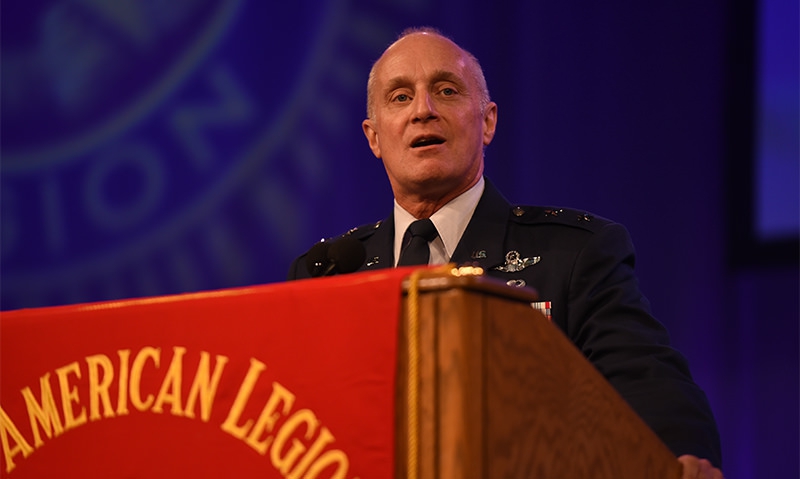
Air Force general encourages veterans to share their stories to help recruit the next generation of servicemembers.
Maj. Gen. Garrett Harencak implores military recruiters to just tell their story.
Harencak’s story begins when he left Elmwood Park, N.J., in June 1979. “Everything great in my life happened after that because I left to join America’s Air Force,” he told The American Legion’s national convention Wednesday in Reno, Nev. “I owe everything to this great Air Force. I’m a better person — my wife, my children, the dogs we rescued along the way — everything about the Air Force has made me the person who I am.”
As commander of the Air Force Recruiting Service, Joint Base San Antonio-Randolph, Harencak commands more than 2,470 airmen and civilians in more than 1,100 recruiting offices across the United States and abroad. Harencak oversees recruiting efforts and strategic marketing for the U.S. Air Force.
Focusing on the thousands of veterans in the convention, he said, “All of us are better off because we served.”
And that’s the message that he wants to convey to young people and persuade them to join the military.
“I believe we are bringing the single greatest weapons system into our Air Force,” he said. “And I have flown some great weapons systems — the B2 bomber, the B1, the B52. We have great weapons systems out there and we need them. But what I have learned in my 38 years in the Air Force is that the greatest weapons system does not come with a tail number. The greatest weapons system does not come with a serial number stamped on it. The greatest weapons system comes with a Social Security number.”
Still, recruiting in today’s world poses a significant challenge for the Air Force and the other services. Harnecak says that 52 percent of American parents will not recommend military service to their children. And, if at least one parent has a college degree, that number increases.
In 1965, 91 percent of American homes had a core military influencer in the home, according to Harencak. By 1995 that number had fallen to 40 percent. Today, it is only 14 percent. “The influencers are not there,” he said. “That manifests itself in a lot of ways.”
To Harencak, it’s important for recruiters to counter this by sharing their stories and being personable with potential servicemembers.
“We have to engage with people,” Harencak said, adding that there is a lot of misinformation on websites. “All of us — who know better — must look them in the eye and say that is not true. Should you be injured, we will take care of you for the rest of your lives, to the best extent we can.
“Recruiting today cannot be left up to social media. Recruiting today cannot be left up to the Internet. It must be as it always was — personal.”
Harencak, a life member of Post 170 in New Jersey, has American Legion blood in his veins. As a youth, he played Legion Baseball and was a member of Sons of The American Legion. “I am here to thank you because what you do on behalf of The American Legion is inspiring. Our Air Force, Marines, Army, Navy and Coast Guardsmen — we all thank you for what you are doing as you fight for the veterans of our great nation.”
He closed by asking Legionnaires to help recruit the next generation of servicemembers by asking them to work with their schools and local recruiters.
“There just aren’t enough of us out there,” he said. “Everyone in the Air Force thanks you, American Legion. You do a lot. Now we’re asking you to do more.”
- Convention

